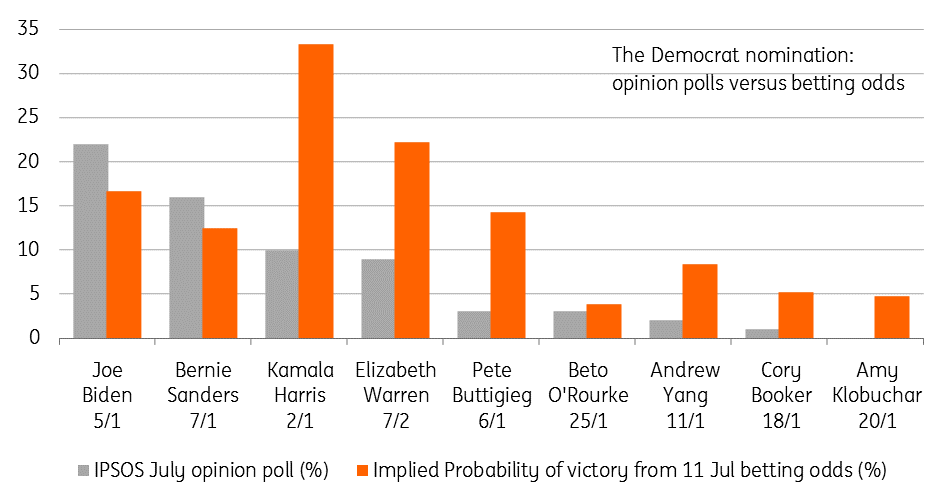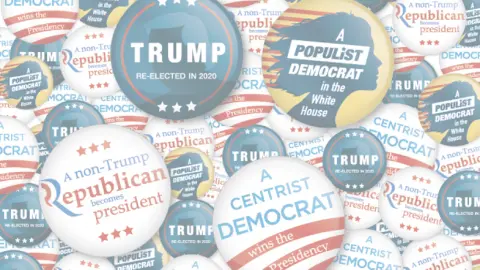Trump leads while Democratic front runners emerge
President Trump's re-election odds are strengthening but a second term is far from certain. In the first of a series of updates to our in-depth report, US Politics Watch: Four Scenarios for 2020 and Beyond, we have collaborated once again with Oxford Analytica to look at how the race is shaping up

Where things stand
Former Vice President Joe Biden remains the early front runner in the Democratic Party primary, though his lead has significantly narrowed following the first Democratic Party debates, where both Elizabeth Warren and Kamala Harris were seen as performing well. Both have since improved in the polls, and are now competing with Bernie Sanders for second position. With only nine candidates polling at 2% or more in national polls during June, a failure by smaller candidates to increase their support in July may see the number of candidates reduced.
The US economy has continued to perform well despite increased trade tensions, with the stock market up around 4% since early April, increasing President Trump’s odds of re-election. The Federal Reserve is indicating it will be cutting interest rates, but this is characterised as an "insurance policy" to cushion against possible future shocks. Officials continue to talk of "solid" activity, which was underlined by June's rebound in job creation. After officially launching his re-election campaign, President Trump appears set to be the Republican party nominee, as the risk of impeachment or a serious primary challenge has significantly diminished.
Impacts on each scenario
Scenario drivers
Economic performance – A less positive backdrop for Trump
After posting robust growth of 3.1% annualized in the first quarter, the US outlook is now looking less positive. Recent data suggests the economy is more vulnerable to the negative US-China trade headlines than it was in the second half of 2018. Manufacturing is bearing the brunt, although there has been some softening in recent service sector surveys too. The Federal Reserve kept interest rates steady at its June meeting, but is now clearly signalling a precautionary "insurance" 25bp interest rate cut on 31 July even though officials retain a positive outlook on the economy outlook.
Trade tensions are the key risk for the economy. Prolonged uncertainty regarding trade policy runs the risk that firms sit on their hands, which implies a slowdown in investment and hiring that could lead to lower consumer spending and broader economic weakness. The Trump-Xi meeting on the sidelines of the G20 summit has led to a restarting of talks although neither side seems willing to offer major concessions at this stage. As such, we could see a re-escalation of tensions with additional tit-for-tat tariff hikes. We suspect that only after both sides experience the increasingly negative effect of the trade war will they be prepared to make concessions and finally strike a deal. As discussed in the April release, such a deal would be an undoubted boost to Trump and to global trade.
This suggests that the economic backdrop may start to become less supportive for President Trump's re-election. Indeed in three key swing states, Ohio, Michigan and Pennsylvania, the unemployment rate remains above the national average, indicating weaker economies in areas critical to a Trump re-election bid. Given the US economic position is currently one of a growth slowdown rather than a full blown recession, this appears more supportive of a centrist Democrat rather than triggering the Populist Democrat scenario, which is reliant on a more negative economic outlook.
However, President Trump will be well aware that pushing too hard for too long on trade risks a weaker economy and plunging asset markets, which would undoubtedly hurt his re-election chances. As such we would expect him to strike a “deal” around the turn of the year even if it doesn't meet all of his demands. Such an outcome would be cheered by markets and provide a positive boost for economic sentiment with Trump likely claiming it as a personal victory that supports his case for the Presidency.
Salient issue – Trade, Trump and foreign policy at center stage
Foreign trade and President Trump’s handling of foreign disputes, particularly vis-à-vis Iran, are the current salient political issues, strengthening primarily the Trump re-elected and Centrist Democrat scenarios, as both Trump himself, and his foreign policy receive constant coverage. The ongoing trade conflict with China continues to impact the market and US businesses and has become the flagship foreign policy of Trump’s administration. While a deal is not currently within sight, the use of Huawei as leverage to gain concessions from Beijing later in 2019 would strengthen the likelihood of a Trump re-election scenario.
Prior to a deal being agreed, the trade conflict with China is likely to remain in its current pattern of sporadic escalation. It is likely to thus slightly fall out of view over the coming weeks, as the shock of the most recent escalation wears off, allowing another issue, potentially the handling of migration into the United States, to become a more poignant issue, weakening both Democratic scenarios.
Conversely, the ongoing dispute with Iran, which originated from attacks on international oil tankers in the Strait of Hormuz and escalated to the downing of an unmanned American drone, has ignited criticism of Trump’s handling of foreign policy and made his temperament a key talking point. Anything but a swift and peaceful de-escalation of that conflict in the coming weeks is likely to strengthen both the Centrist and Populist Democrat scenarios due to increased concerns over Trump’s response and his seemingly unpredictable foreign policy.
The new batch of US sanctions against Iran however, which directly target senior individuals including Supreme Leader Ayatollah Ali Khamenei, has likely ended the possibility of a diplomatic de-escalation of hostilities. Tensions with Iran are thus set to remain high over the coming months, and will continue to be a focal point of critiques of the Trump administration.
Identity politics – Illegal immigration and race based divides
Discussions around identity politics remain based around racial issues, such as illegal immigration, strengthening the odds of the Trump re-elected scenario. The declaration of an emergency on the US border with Mexico, and the threat to impose tariffs on Mexico if it did not improve border security, has kept immigration -- and with it racial based politics -- a more prominent issue than socio-economic divides. Race has also begun to impact the Democratic presidential primary where comments made by former Vice President Joe Biden on his ability to work across the aisle in Congress with noted segregationists in the 1970s drew criticism from his fellow candidates, helping to shed further light on liberal issues such as reparations.
With the economy set to continue on its positive trend in the medium term, socio-economic divides will continue to be of secondary importance as a driver of identity politics, while race based issues, in particular illegal immigration, will likely remain the primary fault line. The uncertainty surrounding the competing border appropriations bills in Congress and the threat of a Presidential veto will continue to heighten the importance of this issue in July and potentially into the fall if only a temporary funding solution is reached.
The Democratic front runners
While it is still early days in the Democratic primary, and plenty of time remains for another candidate to have a breakout moment, a group of competitive candidates has started to emerge.
Top 5 Democratic Party nominees
Former Vice President Joe Biden continues to lead nationally, but this has dwindled following the first Democratic debates, where both Senators Elizabeth Warren and Kamala Harris performed well, and have seen subsequent boosts to their poll numbers. For now, Senator Bernie Sanders remains in second place in national polls, though he has failed to grow his support. Meanwhile, South Bend Indiana mayor Pete Buttigieg has managed to raise his profile and substantial financial sums, with his 24.8 million dollars the most of any candidate.
Joe Biden ahead in the polls, but the money is on Kamala Harris

Signature policies
Biden
Former Vice President Joe Biden currently lacks a signature policy position, and instead has focused on two broader themes: foreign policy and a return to bipartisanship. Biden aims to use his experience in working across the aisle to govern, and his traditional view on foreign affairs to create the appearance of a safe pair of hands.
Harris
Harris, similar to Biden, is not strongly associated with many unique policies and has struck out a position generally in favor of some more modest progressive proposals. The most notable exception is in the area of equal pay, whereby Harris has promised to undertake an executive action to fine companies for the continuation of a wage gap between male and female employees and raising teacher salaries, a popular and important constituency.
Buttigieg
Along with Warren and Sanders, Buttigieg is a supporter of many progressive policies including agendas such as the Green New Deal. His signature policy is a national service program for young adults, in order to foster greater social cohesion within American society, and ideas to remake the Supreme Court.
Warren
Warren has been the most active candidate in outlining policy positions, with her campaign already detailing plans on universal child care, defense procurement, reproductive rights protection and antitrust against technology firms. Her signature position however is her plan to introduce a wealth tax against Americans earning more than 50 million dollars per year.
Sanders
Sanders’ campaign is highly progressive, with key issues promoting many long held liberal policy objectives. While not alone in championing Medicare for All, Sanders has been one of its most vocal supporters. Abolishing college tuition fees and a significant increase in the estate tax to encourage greater income distribution are also among his primary issues.
Vulnerabilities in an election against Trump
Biden
_ Previous voting record in Congress which is out of line with current progressive policies
_ Lack of clear policy proposals, return to the past, and his advanced age
_ Apathy from liberal wing of the Democratic party may hamper grassroots efforts
Harris
_ A career trajectory, mirroring that of Barack Obama, could be used to convince voters of her inexperience
_ Positions taken while a prosecutor are unpopular with some liberal voters
_ Lack of major legislative achievements
_ Will face obstacles as African-American and a woman
Buttigieg
_ Will be treated dismissively due to young age and no national political experience
_ Poor performance of South Bend, Indiana, in particular on issues of social equality and police brutality
_ May struggle to attract socially conservative Democratic voters
Warren
_ Overly left for the national electorate in a positive economy
_ Increased attention on her personal background and identity scandal may tarnish her image and reputation
_ May be portrayed as similar to Hillary Clinton and elitist, given her Harvard background
Sanders
_ Painted as too far left for the electorate
_ Advanced age could hurt him appealing to middle-aged voters. Polls poorly within his own age group
_ Lack of large donors could negatively impact funding in a long election cycle
What next
President Trump is set to remain in the strongest position over the coming months, as the economy looks likely to continue posting positive results during the summer. While a trade agreement with China, or a significant international agreement with Iran or North Korea remains a long way off, the continued focus on trade and foreign policy will only serve to strengthen his chances of re-election. The likelihood of another Republican running for President will continue to fall, with the Republican Phoenix scenario significantly handicapped.
For the Democratic candidates, the initial fracturing between tiers of candidates will continue and solidify. With the rules to make the debate stage for the third Democratic debates in mid-September more stringent than those for the first two in June and July, the field of Democratic candidates is expected to narrow towards the end of the summer, as more struggle to get national coverage. This will further escalate the grouping of the field into Tier-1 and Tier-2 candidates, allowing policy divisions between those in the top tier to grow in importance. By the autumn, differences on key policy issues will be far clearer for the main group of candidates.
This update follows our in-depth report US Politics Watch: Four Scenarios for 2020 and Beyond published in April 2019, examining the potential electoral outcomes and the political, economic and market implications of each scenario.
Download
Download article
15 July 2019
In case you missed it: Trump, Draghi and Johnson This bundle contains 12 ArticlesThis publication has been prepared by ING solely for information purposes irrespective of a particular user's means, financial situation or investment objectives. The information does not constitute investment recommendation, and nor is it investment, legal or tax advice or an offer or solicitation to purchase or sell any financial instrument. Read more

